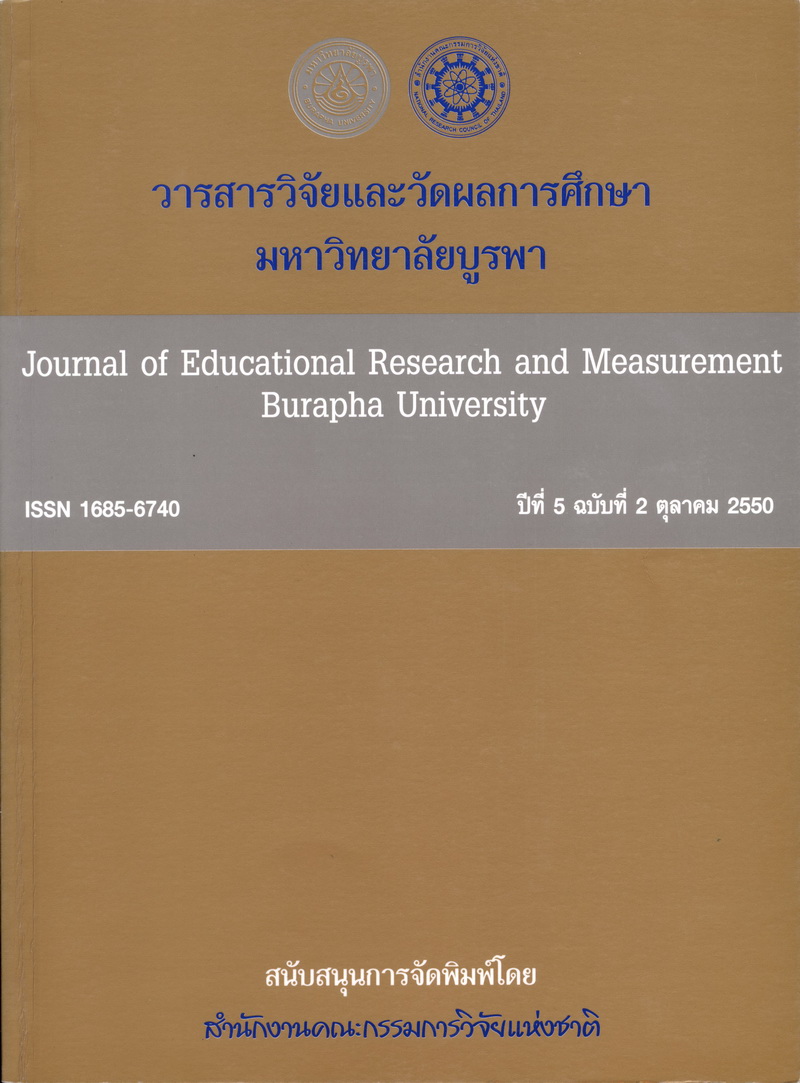การตรวจสอบโมเดลสองคลื่นของรูปแบบกลวิธีการประมวลผลข้อมูล ของนักศึกษาระดับปริญญาตรี
Main Article Content
Abstract
การวิจัยนี้มีวัตถุประสงค์เพื่อตรวจสอบความตรงเชิงโครงสร้างของโมเดลรูปแบบกลวิธีการประมวลผลข้อมูลของนักศึกษาระดับปริญญาตรีในกลุ่มทดลองระหว่างก่อน กับหลังพัฒนาทักษะการคิดและระหว่างกลุ่มทดลองกับกลุ่มเปรียบเทียบหรือกลุ่มที่ไม่ได้พัฒนาทักษะการคิด ตามแนวคิดรูปแบบกลวิธีการประมวลผลข้อมูลของนักศึกษาของฟาร์เรลล์และคอทร์ลิค( Farrell & Kotrlik, 2003) และงานวิจัยที่เกี่ยวข้อง กลุ่มตัวอย่างเป็นนิสิตระดับปริญญาตรี ชั้นปี ที่ 1 มหาวิทยาลัยบูรพา ปี การศึกษา 2549 จำนวน 840 คน แบ่งเป็น กลุ่มทดลองจำนวน 420 คน และกลุ่มเปรียบเทียบจำนวน 420 คน เครื่องมือที่ใช้เป็นแบบสอบถามรูปแบบกลวิธีการประมวลผลข้อมูลของนักศึกษาระดับปริญญาตรี
ผลการวิจัยหลักปรากฏว่า
1. ความตรงเชิงโครงสร้างของโมเดลรูปแบบกลวิธีการประมวลผลข้อมูลของนักศึกษาระดับ
ปริญญาตรี ในกลุ่มทดลองระหว่างก่อนกับหลังพัฒนาทักษะการคิด มี 4 องค์ประกอบได้แก่ 1) รูปแบบด้าน
การเห็นมิติ-สัมพันธ์ 2) รูปแบบด้านการวิเคราะห์ 3) รูปแบบด้านสังคม และ 4) รูปแบบด้านการจัดประเภท
ค่าน้ำหนักองค์ประกอบของรูปแบบย่อยหลังพัฒนาทักษะการคิดสูงกว่าก่อนพัฒนาทักษะการคิดอย่างมี
นัยสำคัญทางสถิติจำนวน 3 รูปแบบ ได้แก่ 1) รูปแบบด้านการวิเคราะห์ 2) รูปแบบด้านการเห็น-มิติ
สัมพันธ์ และ 3) รูปแบบด้านสังคม
2. ความตรงเชิงโครงสร้างของโมเดลรูปแบบกลวิธีการประมวลผลข้อมูลของนักศึกษาระดับ
ปริญญาตรี ในกลุ่มทดลองและกลุ่มเปรียบเทียบ แสดงให้เห็นว่า ค่าน้ำหนักองค์ประกอบของรูปแบบย่อยกลุ่ม
ทดลองสูงกว่ากลุ่มเปรียบเทียบ อย่างมีนัยสำคัญทางสถิติจำนวน 2 รูปแบบ ได้แก่ 1) รูปแบบด้านการ
วิเคราะห์ และ 2) รูปแบบด้านสังคม
An Examination of the Two-Wave Models of Strategical Information Processing Styles Among Undergraduates
The objective of this study was to examine the construct validity of strategical information processing styles among undergraduates in an experimental group, before and after receiving developing thinking skills, and in an experimental group and a comparison group, or non-receiving developing thinking skills group, based on the strategical information processing styles of Farrell and Kotrlik (2003) and as seen in related literature. The sample involved 840 freshmen of Burapha University in academic year 2006. It was divided into two subgroups, 420 for the experimental group and 420 for the comparison
group. The research instrument was the strategical information processing styles among undergraduates’
questionnaire.
The major findings were:
1. The construct validity of the strategical information processing styles among the undergraduates in the experimental group before and after receiving developing thinking skills was found to consist of the same factors: visuo-spatial style, analytical style, social style, and categorical style. The factor loadings of three variables, analytical style, visuo-spatial style, and social style, were
statistically higher after receiving developing thinking skills than before.
2. The construct validity of the strategical information processing styles among the undergraduates in the experimental and comparison groups revealed that the factor loadings of two variables, analytical style and social style, were statistically higher in the experimental group.

